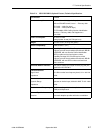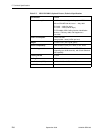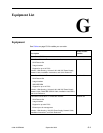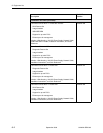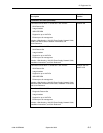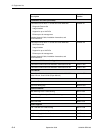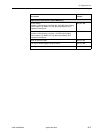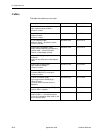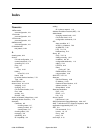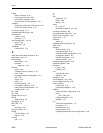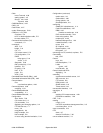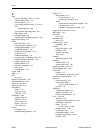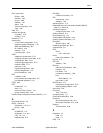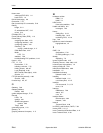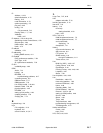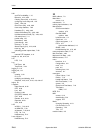
9128-A2-GB20-80 September 2002
IN-1
Index
Numerics
1MPort mode
auto-configuration, 4-9
1Port mode
auto-configuration, 4-9
1PPort mode
auto-configuration, 4-9
2MPorts mode
auto-configuration, 4-9
55 hexadecimal
test pattern, 8-24
A
aborting tests, 8-21
Access
CLI and configuration, 1-3
control commands, C-3
controlling CLI, 6-14
Easy, 4-3
Level
Port, 4-101
limiting
router CLI, 6-14
Name, 4-83
to another devices interface, 7-70
Type, 4-88
Access Dial-In, 6-4
Access Level, 6-11–6-12
assigning, 6-10
changing, 6-15
CLI command modes, 6-14
Port, 4-98
security, 2-9
Session, 4-85
Action on Network Yellow Alarm, 4-42
activating Modem PassThru, 7-70
Activation
Certificate, 9-5
checking status, 9-7
entering number, 9-7
viewing status, 9-7
checking status, 9-9
managing, 9-6
scheduling, 9-8
SLV capability, 9-4
adding
SLV units to network, 11-3
Address Resolution Protocol (ARP), 5-3
Administrator
changing access levels, 6-15
CLI Access Level, 6-14
configuration commands, 5-2
AIS
alarm condition, 8-7
at DSX-1 or Network, 7-20
at ISDN PRI, 7-20
LED, 7-8, 7-10
linkDown trap, B-11
Alarm, 8-7
(Fail), 7-8–7-9
adding manually, 10-11
conditions, 8-2, 8-7
configurable thresholds, 1-10
editing, 10-9
LED is lit, 8-14
Relay
turning off, 7-81
RMON defaults, B-18
using template, 10-8
ALM LED, 7-8–7-10
Alternate
Dial-Out Directory, 4-93
IP Address, 4-103
Outbound Phone Number, 4-51
software revision, 7-3
Subnet Mask, 4-103
Alternate Destination
DLCI, 4-70
EDLCI, 4-71
Link, 4-70
Annex A and D
LMI Protocol, 4-61
ANSI Performance Report Messages, 4-36, 4-47
ANSI T1.403 Annex B FT1 Channel Loopback, 8-32
applications supported by NAT, 5-5
ARP, 5-3
CLI commands, C-11
inverse, 1-2, 1-5
Proxy, 4-95
proxy, 5-3
arrow keys, 2-10



